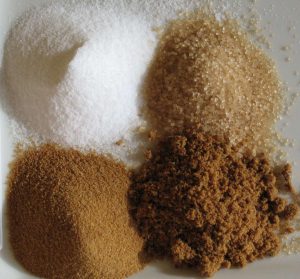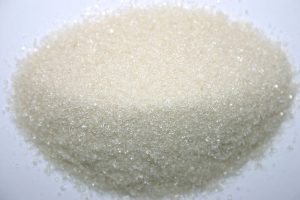Avoiding Sugar – The Source of Many Health Problems
There are plenty of reasons to completely remove sugar from our diets…but this is a difficult venture for most. Sugar is all too appealing and proves to be very addicting more so than not. The task of avoiding sugar is quite daunting with the convenience of fast foods, processed foods, and varied forms of sugar hidden within commonly purchased supermarket foods (not just limited to soda pops, candy, and even “healthy” fruit juices/ beverages). This coupled with busy lifestyles, often translates to lack of time for preparing home cooked meals making it all too easy to turn to unhealthy foods that lead to unhealthy bodies in the long run.
Sugar and Its Many Disguises
Sucrose, otherwise known as table sugar is often times sourced from raw cane or beet sugar and refined resulting in crystals made up of a combination of fructose & glucose monosaccharides. Dextrose, fructose, glucose, maltose, lactose, evaporated cane juice, malt sugar, corn syrup, and high-fructose corn syrup are some of the many names of sugar like ingredients otherwise known as sweeteners. In nature, sugar is found in many fruits and though they provide a healthier alternative to sweets, over indulging can have similar effects to consuming unhealthy amounts of sugar, so moderation and balance is needed.
Let’s face it, a lot of us often snack, especially in between meals or breaks. Whether it is a healthy granola bar or a candy bar, chances are sugar is included. But just how much sugar is present (per serving) should be the prime determinant in your selections for snack time and be sure to not over indulge so your sugar levels don’t spike (especially when on an empty stomach).
Health Problems that Can Result from a Sugar Filled Diet
A slew of diseases have now been found to be deeply rooted in the enormously high and ever-increasing intake of sugar. So avoiding sugar (the source of many health problems) should be at the top of many of our priority lists. Sugar is everywhere and this is an ever growing problem that has to change and the sooner the better.
Blood glucose level abnormalities, heart disease, mental decline, inflammation of the joints and or body leading to arthritic diseases are a few of many avenues the deadly love of sugar leads to.

Sugar consumption leads to insulin release. Insulin is a hormone that allows cells to make use of sugar. It basically unlocks the cells to let the sugar molecule, glucose in so it could be used for energy or stored for later use; however, the body is capable of making it’s own sugar as it needs it based on the body’s energy needs. Any excess sugar/glucose that is not needed or used for energy is stored as fat.
Also, the more sugar you consume, the higher the levels of insulin released. High levels of insulin then disrupts Leptin, which is a hormone that sends signals to the brain when you are full resulting in your brain telling your body to stop eating, when this doesn’t happen you can overeat resulting in the packing on of pounds.
At this point in time, more so than ever, we as individuals are responsible for our own health and the improvement or decline thereof; especially, when it comes to the foods we choose to put in our bodies. It goes without saying, you are what you eat, whether it is practically instantaneous or slow to manifest; the ill effects of excessive sugar consumption is all too real and is becoming more so apparent in today’s sugar filled and ever-increasing waistline of a world. In other words, sugar can make you sick and fat!
Try giving up sugar and foods (especially beverages) containing sugar or sugar substitutes for a month or two and you could lose at least 10 pounds if not more (upwards of 30 or so pounds), just make sure you replace those sugary drinks you’ve given up, with lots of pure water. Water infused with fruits is still an option if just plain water is too much to handle or gets plain boring. This in a sense detoxifies your body and helps you curb those sugar cravings.
Steps You Can Take to Limit Your Sugar Intake
Reading the ingredients of the products you purchase is one of the first steps to take when it comes to avoiding sugar and in return the host of health problems it can lead to. Next time you take a trip to the grocery store, be sure to check out the label of your favorite can of soup or better yet for a more detailed insight, check out the Nutrition Facts and see just how much sugar you will be getting per serving.
Canned fruits, juices, spaghetti sauce, various condiments like ketchup, barbecue sauce, and salad dressings; canned baked beans, and even some brands or flavors of canned tuna can be unnecessary sources that add in much more sugar than you would willingly want to consume.
So how do you avoid these readily available pitfalls? Well, you could keep an ever watchful eye on the labels of those favorite packaged goods you love to buy or you can opt for simpler versions of your favorite foods. For instance, instead of buying canned fruits soaked in sugary syrup (yes the “No Sugar” added, is often part of this – I will explain later), opt for frozen versions that are simply those fruits conveniently prepped, minus the added sugar. And if time is not an issue for you, then all the better, because you can grab a variety of seasonal fruits you love to eat and make your own delightful blend of fruits packaged and ready to go for your enjoyment.
Packaging your own foods can be liberating for you since you not only know what you have made, but also, how you made it – you are in touch with the steps it took you to prepare and have your food ready in such a manner that is up to your health standards as far as nutrition is concerned. You can package foods for a later time using via vacuum sealing or freezer bags if you would like to extend the time frame of eating those foods or simply storing in your favorite glassware for up to 7 days in your refrigerator would do just fine.
You can also opt for truly sugar free products and by that I mean purchasing products that have NO sugar added whatsoever, and that includes sugar substitutes like dextrose and aspartame among many others.
Other ways to avoid excessive sugar intake would be to limit carbohydrates (white potatoes, bread, pasta, cakes, cookies, grains, etc.) and alcohol which convert to sugar in the body causing a spike in insulin levels.
Thinking of Opting for “Sugar-Free” Versions of Your Favorite Foods? Think Again!
“No Sugar Added” and “Sugar-Free” are often times used interchangeable to attract consumers to purchasing products loaded with artificial sweeteners or sugar substitutes (i.e. Acesulfame Potassium, Aspartame, Sucralose, Maltitol, among others). So it is up to us as consumers to be vigilant when it comes to reading labels on the products we buy and knowing what marketing phrases to be weary it when it comes to avoiding or even eliminating certain ingredients like sugar from our diets.
A general rule of thumb to adhere to when it comes to the ingredients listed on your food labels is if it doesn’t occur in nature, why eat it. Artificial sweeteners or sugar substitutes should be avoided in general because the benefits certainly do not outweigh the havoc they can wreak within the body. A great example of this is Aspartame which can be a problem especially for those who have the genetic condition phenylketonuria or PKU, since it breaks down into different products, one of which is phenylalanine which those with PKU have a problem processing resulting in toxic buildup in the body.
Artificial sweeteners are just that artificial, so why not opt for a more natural option when it comes to sweeteners and use them sparingly. Good alternatives are unadulterated honey, maple syrup, agave syrup, and even stevia (check labels & avoid those products loaded with fillers). Yes, they are all technically sugar, but if purchased in their raw forms instead of refined forms can prove a better option, more so than highly refined table sugar.
Keep in mind that raw sugar (for example, Muscovado, Turbinado) can also be an option, since it is minimally processed compared to common table sugar; however, it is still an addictive substance and should be used as little as possible.

Conclusion
As with all things in life, moderation is the KEY. Although difficult to eliminate completely from one’s diet, reducing your sugar consumption will indeed serve you well. The task of removing or limiting your sugar intake can be simplified by simply eliminating or at the least, cutting back on processed foods (TV dinners, canned soups, etc.) and opting for fresh foods prepped in advance or as needed. If you haven’t done so already, a switch to a healthy diet consisted mainly of plants and a small portion of meat will help reduce time spent preparing and cooking meals, since plant based meals typically require less time overall. And you can choose to prepare the meat portion of your meals in one setting for the week since it is no longer the prime focus of your meal. With all things said and done, it is always best to do what works for the betterment of your health and the changes you make should be at your own pace – no need to stress over it, just do it and do it gradually.

3 Comments